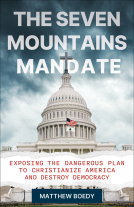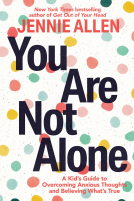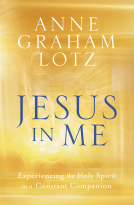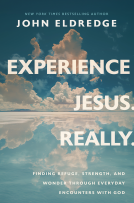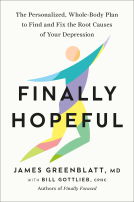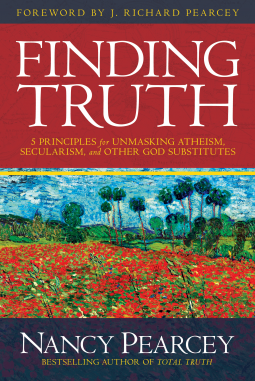
Finding Truth
5 Principles for Unmasking Atheism, Secularism, and Other God Substitutes
by Nancy Pearcey
This title was previously available on NetGalley and is now archived.
Send NetGalley books directly to your Kindle or Kindle app
1
To read on a Kindle or Kindle app, please add kindle@netgalley.com as an approved email address to receive files in your Amazon account. Click here for step-by-step instructions.
2
Also find your Kindle email address within your Amazon account, and enter it here.
Pub Date Mar 01 2015 | Archive Date Nov 30 2015
David C Cook | David C. Cook
Description
That's the mantra in many circles today—whether the church, the classroom, the campus, or the voting booth.
Time for a Reality Check
Nancy Pearcey, bestselling and critically acclaimed author, offers fresh tools to break free from presumed certainties and test them against reality. In Finding Truth, she explains five powerful principles that penetrate to the core of any worldview—secular or religious—to uncover its deepest motivations and weigh its claims. A former agnostic, Pearcey demonstrates that a robust Christian worldview matches reality—that it is not only true but attractive, granting higher dignity to the human person than any alternative. Finding Truth displays Pearcey's well-earned reputation for clear and cogent writing. She brings themes to life with personal stories and real-world examples. And the study guide in Finding Truth was shaped by questions from readers like you, from teens to college professors, and is ideal for individual or group study.
Available Editions
| EDITION | Hardcover |
| ISBN | 9780781413084 |
| PRICE | $22.99 (USD) |
Average rating from 8 members
Featured Reviews
 Joan N, Reviewer
Joan N, Reviewer
Some claim Christian faith does not have an intellectual foundation. Pearcey puts that false notion to rest in this book.
Pearcey looks at what Paul wrote in Romans and notes that he contrasts Christianity with idols. People believe in God or a God replacement, an idol. She extracts five principles from Paul's writing and applies them to world-views.
Principle 1. Identify the idol. Everyone that reject God, she says, has one. She takes us through current thought, identifying the idols of materialism, rationalism, etc.
Principle 2. Identify the idol's reductionism. Belief in anything other than man being created by God in the image of God reduces the view of human life.
Principle 3. Test the idol: Does it contradict what we know about the world? Every idol-based world-view will fail this test.
Principle 4. Test the idol: Does the world-view contradict itself? Every one will collapse and Pearcey has done a great job in showing us how that happens when one takes a world-view to its logical conclusion.
Principle 5. Replace the idol. Make the case for Christianity as it is the world-view providing the better answers.
Pearcey wants Christians to develop critical thinking skills and use the above principles. “If you master the strategic principles in this book, they will equip you to identify and engage critically with the ideas that have shaped the Western world in every subject area.”
This is an excellent book. I was amazed at how Pearcey took on today's wide spread philosophies. She frequently showed how the philosophers “borrow” from Christianity, acting as if Christianity is true. The book helps us better understand history. It also shows how Christianity is the best at explaining humanity, the rational world, etc.
This is a great book to use with young people in families or youth group studies. There is an extensive study guide, about a quarter of the book. This book is a great resource for home school families and Christian schools.
It is a great book for Christians of all ages too. Within its pages are the critical evaluations of philosophies adults are confronted with by their friends and co-workers. With the extensive study guide, this book would make a very good selection for an adult study group.
Nancy Pearcey rejected Christianity as a teen, becoming an agnostic and skeptic. She read a great deal of philosophy. Later, during a visit to L'Abri, she was introduced to an approach to Christianity that addressed her questions. She had discovered apologetics. Pearcey is currently scholar in residence and professor at Houston Baptist University. She is also the editor-at-large of The Pearcey Report. You can find out more about her and her work at http://www.pearceyreport.com/.
David C Cook, 384 pages.
I received a complimentary egalley of this book from the publisher for the purpose of an independent and honest review.
 Conrade Y, Reviewer
Conrade Y, Reviewer
Christianity is facing growing opposition on many different fronts, some of which are also hostile and defiant. Even among believers, there are many who are leaving the faith, discouraged or disillusioned. One example is a congressional chief of staff, Bill Wichterman who said he "lost his faith at an evangelical college." At the heart of the problem is the perception that Christianity had no intellectual foundation to meet the challenges of atheism, secularism, and other principalities that dominate the world today. No way! said the author of the bestselling book TOTAL TRUTH, and Director of the Francis Schaeffer Center for Worldview and Culture at Houston Baptist University. Using the inspiration of Bill Wichterman, who eventually "studied his way" back to faith, Pearcey puts together five principles to engage critics, skeptics, and disillusioned individuals to affirm the integrity and rationality of the Christian faith. Based on Romans 1:1-2:16, Pearcey's five principles are:
1) Identify the Idol 2) Identify the Idol's Reductionism 3) Test the Idol: Does It Contradict What We Know about the World?
4) Test the Idol: Does It Contradict Itself?
5) Replace the Idol: Make the Case for Christianity
For each principle, Pearcey spends a chapter applying it to various opposing voices. The first principle is to identify the idol, as applied to "Twilight of the gods" in which people doing devotion can avoid becoming too engrossed with personal devotional activities, and learn to engage the world confidently and boldly. When people find their own faith irrelevant to life, or when they fail to relate what they learn with how they live, they may eventually lose heart and lose faith. They need to engage the "Enlightenment rationalists" (god of reason); the imagination deities (god of Romanticism); the nationalists (god of nation idealizing); Marxism (economic god of sin and salvation). Pearcey makes her case that rather than compare religion with others, use idol instead. Every worldview is fundamentally a worship of some kind of god-idol. Like Tim Keller who said that every culture can be analyzed by simply identifying their idols, Atheism is not about a belief in something but a belief against something. All religions stem from a basic philosophy of life. There are religions without god, religions without morality, and religions that represent a search for meaning in life. Where we begin our search is critical. If we begin with our senses, it is likely we end with our senses, which makes it a spiritual merry go round. Thinkers of the Enlightenment were simply searching for a substitute for God. Pearcey calls it the "idol of the mind." For the artist, there is a temptation toward "idol of the imagination" and materialism as idol of the created things. Before anyone can even begin to engage, one must identify the source of idolatry.
The second principle is that of identifying the idol's reductionism. Beginning with the story of John Erickson, who left his devout Bible believing upbringing and embraced the philosophy of Nietzsche, Pearcey asks why God would allow people to go through periods of "stupid years." Why would God gave people up to themselves? Idols will always reduce the true God down to the size of the idols themselves. It is dehumanizing when we reduce people down to our expectations. It cheats, suppresses, separates, dichotomizes, reduces the non-material world into material equivalents, and other postmodern constructs that secularizes and reduces the Christian faith into what they are not. Apart from postmodernism, pearcey applies this to materialism, Eastern pantheism, New Age movement, other religions and philosophies such as Nazism and Communism. Behind every view is a reductionism of sorts. Eventually, reductionist worldviews will end up in various forms of dualism.
The third principle is a reality test, in learning to test the idols of this age. Beginning with Deborah Mitchell's article, "Why I Raise My Children Without God," which subsequently went viral, there are increasingly many alternatives to try to replace God. Mitchell in this case use materialistic arguments to justify one's definition of good. In this case, theory must explain the experience, otherwise it will be rejected. Such a worldview fails to account for the many things that simply cannot be rationalized away. Pearcey emphasizes the importance to see how such worldviews eventually contradict itself. Pit against the free-will defense where God allows humans to choose, secularists' insistence on certainty is not realistic. Just because they cannot explain God, they choose to do away with God totally. Worse, their own worldview becomes a "secular leap of faith" where the entire reality of life rests on their minds. Following Chesterton's convictions, Pearcey believes that if secularists and atheists are truly open, they would have to explain the contradictions their worldviews present. She cites William Lane Craig's poignant observation: "People are not relativistic when it comes to matters of science, engineering, and technology; rather, they are relativistic and pluralistic in matters of religion and ethics." She questions the postmodern tendency to be selective in their criticisms. Readers are gently reminded that even after pointing out the inconsistencies in other worldviews, we need to speak the truth in love, to be sympathetic yet firm. A respectful discussion would be preferred.
The fourth principle is a logical test. Does the argument contradict the facts? Even the idea of no absolutes cannot pass its own test. For example, for "relativism" to be able to stand on its own, it needs to be absolute first. Otherwise, relativism will implode as there is no reference for itself. The key test question is thus: "Does it contradict itself?" Pearcey argues that "all worldviews have to borrow a Christian epistemology." She applies it to evolution that it is true based on "survival value" rather than "truth value." By natural selection, what constitutes truth? For if reason is a product of natural selection, how is it different from "selective skepticism?" She comes back to postmodernism and the deconstructionism that makes claims without subjecting themselves to the same critiques. One of the tests mentioned is about wars and terrorism, and how postmodern thought is able to explain away the social injustices of this world. The main point is that such views self-destruct when applied to themselves.
The fifth principle is to make the case for Christianity by replacing the idol. Other worldviews claim a standard of right and wrong, and yet maintain some kind of a moral law. When they say something is right or wrong, we need to question what the basis for their judgment. She mentions the 19th Century political thinker Alexis de Tocqueville who admitted that the idea of "equal rights" came not from the Romans or Greek, but from Christianity. University human rights is of Christian origin. Science and religion never really conflict. Pearcey boldly states: "In short, every atheist has to adopt a biblical worldview to pursue science at all."
So What?
==========
The chief aim of this book is to help us develop critical thinking in order to find the truth. The five principles stated give us a framework for thinking and analyzing whatever that is presented before us. Each of us will need to understand the contexts of the argument and the environment we live in. We cannot simply apply an argument without structuring them into appropriate circumstances. This is especially when people are at different levels of intellectual engagement. Are they talking at a philosophical or existential level? Are they more interested in truth or in trying to explain some emotions? Worldviews against Christianity often have a reductionism element. They will try to reduce Christians into what they are not, and Christians need to beware of that. Otherwise, believers can be deceived by nice sounding arguments that by themselves are self-contradictory and untrue.
Arguments can sound good on the outside but are empty on the inside. Perhaps, for Christians, the best advice I can give is to first know your faith. Do not simply take the arguments from this book and blindly apply them to all apologetic situations. There is no substitute for knowing our Bibles and the theology the Word of God teaches us. Those who fail to know the Word of God will be sitting ducks for all kinds of flawed philosophies. I am thankful for Pearcey's book that gives us another helping hand to think through the many philosophies and worldviews in this world.
Rating: 4.5 stars of 5.
conrade This book is provided to me courtesy of David C. Cook Publishers and NetGalley in exchange for an honest review. All opinions offered above are mine unless otherwise stated or implied.
Readers who liked this book also liked:
Jim Pojar, Andy MacKinnon, Jamie Fenneman and Leigh Joseph (Styawat)
Nonfiction (Adult), Outdoors & Nature
Harold Earls, IV; Rachel Earls
Biographies & Memoirs, Parenting, Families, Relationships



